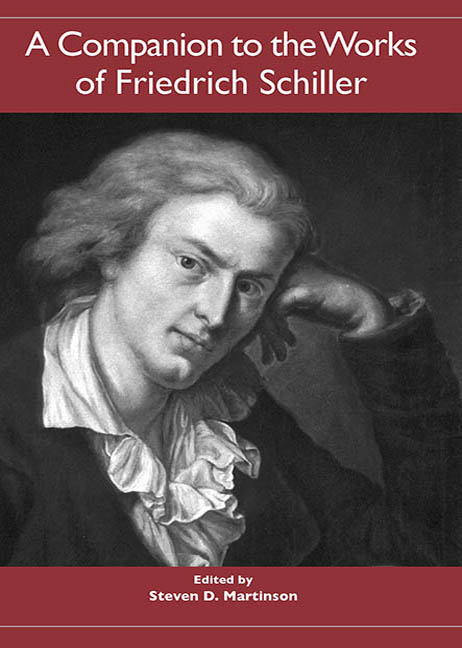Book contents
- Frontmatter
- Dedication
- Contents
- Acknowledgments
- The Works of Friedrich Schiller
- Editions and Abbreviations
- Introduction: Schiller and the New Century
- Intellectual-Historical Settings
- Major Writings
- Die Räuber: Structure, Models, and an Emblem
- Kabale und Liebe Reconsidered
- Great Emotions — Great Criminals?: Schiller's Don Carlos
- Concerning Aesthetic Education
- “On the Shores of Philosophy”: Schiller's Lyric Poetry, 1795
- Wallenstein
- Maria Stuart: Physiology and Politics
- Die Jungfrau von Orleans
- Wilhelm Tell
- Schiller's Legacy
- Works Cited
- Notes on the Contributors
- Index
Wallenstein
from Major Writings
Published online by Cambridge University Press: 28 April 2017
- Frontmatter
- Dedication
- Contents
- Acknowledgments
- The Works of Friedrich Schiller
- Editions and Abbreviations
- Introduction: Schiller and the New Century
- Intellectual-Historical Settings
- Major Writings
- Die Räuber: Structure, Models, and an Emblem
- Kabale und Liebe Reconsidered
- Great Emotions — Great Criminals?: Schiller's Don Carlos
- Concerning Aesthetic Education
- “On the Shores of Philosophy”: Schiller's Lyric Poetry, 1795
- Wallenstein
- Maria Stuart: Physiology and Politics
- Die Jungfrau von Orleans
- Wilhelm Tell
- Schiller's Legacy
- Works Cited
- Notes on the Contributors
- Index
Summary
Unter Saturnus geboren und Jupiter kokettierend, welcher ihm nicht Stich hält.
— Richard Wagner, referring to Schiller's Wallenstein, from an interview with Cosima on May 24, 1870.
An Aesthetic Public Space
In his prologue toWallensteins Lager (Wallenstein's Camp, 1800), the play whose premiere opened the Weimar Theater on October 12, 1798, after its remodeling by Thouret, Schiller speaks of the “new era” that is to begin, after what was even for him a long break from the theater, with the reopening of the Weimar stage. This new era is to encourage the poet, “die alte Bahn verlassend,” to elevate the spectator “aus des Bürgerlebens engem Kreis / Auf einen höhern Schauplatz […], / Nicht unwert des erhabenen Moments / Der Zeit, in dem wir strebend uns bewegen” (ll. 52–56). There is no doubt that when Schiller speaks of “this moment,” in which “um der Menschheit große Gegenstände, / Um Herrschaft und um Freiheit wird gerungen” (ll. 65–66), he is referring to the French Revolution. The stage must prove equal to this large historic kairos by committing itself to the “großen Gegenstand” (l. 57): the world-encompassing content of historical-political tragedy.
In this sense a new era was beginning for Schiller as well, as can be seen if one compares Wallenstein with Don Carlos, the last drama he wrote before the long hiatus in his dramatic production. The latter work, despite its efforts to reach beyond the “Schranken des bürgerlichen Kothurns,” remains a “Familiengemälde aus einem königlichen Hause” that transposes the purely humanistic, domestic-familial situations and relations of the bourgeois tragedy to the courtly level, and places them in a contrapuntal relationship to the obligations of etiquette or of a politics perceived as pure machination (Borchmeyer 1973, 78–90). The political element in this play is presented positively only in the form of ideas (Posa's state utopia!), in a private alliance based on friendship that is interpreted as an archetype for a future republican community. This positive political element, though, does not appear in events having far-reaching implications. The decisive elements of the plot in Don Carlos have practically no consequences that extend beyond the immediate vicinity of the royal household; state affairs, in contrast to all later historical dramas, take place in Don Carlos behind the scene of world politics.
- Type
- Chapter
- Information
- A Companion to the Works of Friedrich Schiller , pp. 189 - 212Publisher: Boydell & BrewerPrint publication year: 2005

